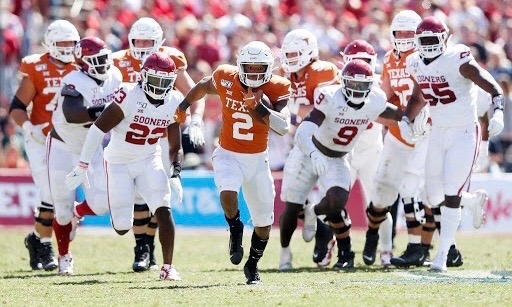
Still at large: Covid-19
As the media has switched narratives from the Covid-19 pandemic that shut down nearly everything, including sports, to the severity of the racial injustices in the world the nation has lost focus on the virus.
Many were awoken back to the news of the virus when college football players headed back into summer camps. Teams such as Alabama, Auburn, Clemson, Iowa State, and others have players that tested positive in their first few weeks back for camp.
Covid-19 first caught traction in the middle of Jan. making its way over from foreign countries, such as China. In the midst of the virus, cases came in at a frenzy as more and more piled up. This led to Universities, businesses, sports, and more shut down to help deplete the rise of the virus.
Almost everything shut down except for essential businesses and employees, that left the sports world to try and find a solution. Leagues such as the NBA, NFL, and MLB were in a rush to find a plan to continue where they left off or to find a way to make it up for the loss the next year.
This left the NCAA to also devise a plan to have college football at its designated time in the fall. Rumors are swirling around that the NCAA may delay the season to make sure the virus has the most minimal risk that it can provide. However, the association came up with a six-week plan to help push a season to start right on time.
The Six-Week Plan
The plan has four phases which starts June 1 and plans to go throughout early Aug., a month before the first game will be playing. The first phase of the plan starts with voluntary workouts that will conduct through the end of June, with virtual instruction eight hours out of the week.
The next phase is 25 days of mandatory workouts which is prior to the first practice day. The next phase consists of meetings and walk-throughs that each team will go through before the practice date as well, around July 24. The last phase comes a month before the first game which would be the preseason practicing, which could potentially start around Aug., 7.
However, this is a plan that gives the college football season hope to start on time. The NCAA made it known the season will not start unless there is at least four weeks of practice for every program before the start date.
This gives the season life to potentially start on time; the sudden rise of Covid-19 cases amongst players could push the date. It could even stall the whole season to protect the health of players, no matter the need of sports for fans at the moment.
The virus amongst teams
Alabama became the first program that had players contract the virus in the weeks coming back to the team. In the first week being back since March, Alabama had five players test positive for the virus. All of these players, not named, were asymptomatic meaning they were not contagious. In the second week, three more players tested positive for Covid; leaving the Tide with eight teammates that succumbed to the virus.
Next came Auburn, following behind them were the likes of Clemson and Iowa State. Each program have three or more players test positive in the mere weeks of voluntary workouts.
The domino effect of the virus seems to be hitting major teams such as Clemson and Alabama, which could scare the NCAA. If this continues to happen, the association may have to stall the plans of a fall season.
The Fall Season
The first day of games seems to be on a tentative date of Aug., 29 with small teams such as East Carolina, Marshall, Hawaii, and others to play. If teams need at least four weeks of practice before they start playing games, this date seems to be on the move.
Big name teams above could push that date back further if cases are still on the rise. During this time, it is only voluntary workouts, meaning players have the choice to show up or not. If during these times the cases pile up, then that means the football season could be up in the air.
The potential for more cases to arise more frequently only comes with time, as mandatory workouts are next on the schedule for programs. More interaction between players, means more chances the virus could be spread.
The NCAA knows it is inevitable for players to contract the virus, however if more players become diagnosed with it this could lead sports and fans back to square one.
The reasoning behind a season
The reason so many leagues and associations are pushing for resumptions of seasons comes down to one factor: money.
If the NCAA loses out on a season, they lose much more than fans would. Fans would lose the sport they love to watch or their favorite players they get to see every Saturday. However, the NCAA loses TV viewings, ticket sales, concessions sales, and other revenue. The season could mean a down spiral of financial hardships for leagues for years to come.
The hardships that Covid-19 can become a reasoning for some sports to either close permanently or shut down until they can make up for lost time. No TV viewings or ticket sales can cause leagues to lose great amounts; amounts many have never seen before.
The knowledge fans need is that sports are still a business at the end of the day. If they cannot make their money, they have to find other avenues to compensate for the lost money.
What next?
Now it becomes a waiting game for programs, coaches, players, and fans. The NCAA, along with everyone else, with carefully follow the course of the four-phase plan. Testing players each week, analyzing results, and providing information will be at the forefront until the season begins.
As teams move along the path of the plan, they must acknowledge that the virus has not went away. They have to put guidelines in place to help abolish the chances of the virus spreading astronomically amongst players. If they can do this, then there could be a fall football season in sight.
However, if teams cannot keep the virus from spreading within their program, it could prove to be detrimental. It could leave the NCAA and fans with a delayed season, or worse, no season at all.
As big names team continually conduct practices, eyes will be on the programs to see if the virus comes to a halt. If these teams continually have cases rise throughout their time on the field, the NCAA will have pressure on them. The pressure will come from voices to discontinue the hopes for a season to protect players health.
All eyes lie on the NCAA, their four-phase plan, and programs. The season is set to start in Aug., but many fans could be seeing changes. Various amounts of changes can bring a sports world that a fan could never think. The sports world is hoping for a return, and the NCAA is trying to deliver; but will they?




